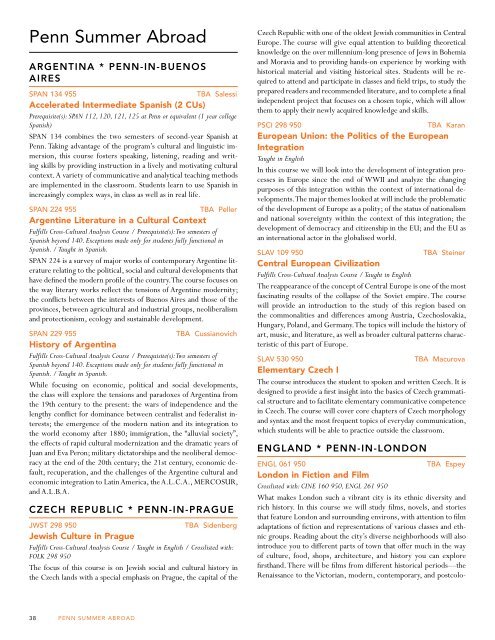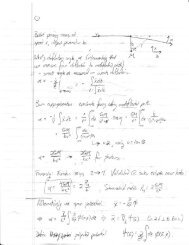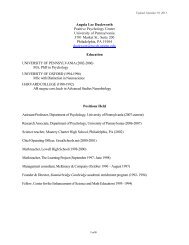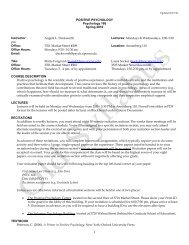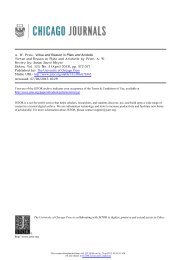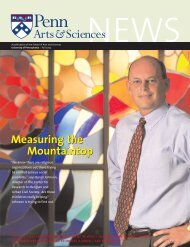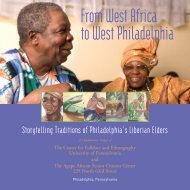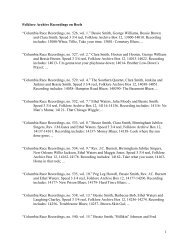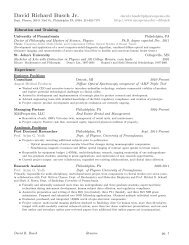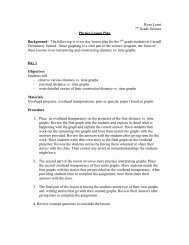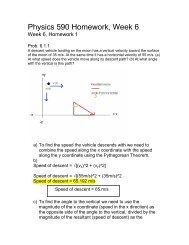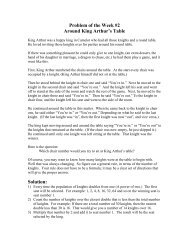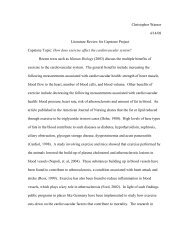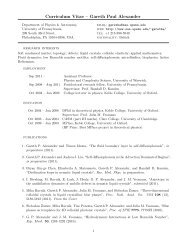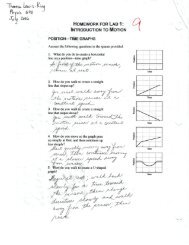PENN SUMMER - University of Pennsylvania
PENN SUMMER - University of Pennsylvania
PENN SUMMER - University of Pennsylvania
Create successful ePaper yourself
Turn your PDF publications into a flip-book with our unique Google optimized e-Paper software.
Penn summer Abroad<br />
arGenTina * Penn-in-BUenoS<br />
aireS<br />
sPan 134 955 TBa salessi<br />
Accelerated Intermediate Spanish (2 CUs)<br />
Prerequisite(s): SPAN 112, 120, 121, 125 at Penn or equivalent (1 year college<br />
Spanish)<br />
SPAN 134 combines the two semesters <strong>of</strong> second-year Spanish at<br />
Penn. Taking advantage <strong>of</strong> the program’s cultural and linguistic immersion,<br />
this course fosters speaking, listening, reading and writing<br />
skills by providing instruction in a lively and motivating cultural<br />
context. A variety <strong>of</strong> communicative and analytical teaching methods<br />
are implemented in the classroom. Students learn to use Spanish in<br />
increasingly complex ways, in class as well as in real life.<br />
sPan 224 955 TBa Peller<br />
Argentine Literature in a Cultural Context<br />
Fulfills Cross-Cultural Analysis Course / Prerequisite(s): Two semesters <strong>of</strong><br />
Spanish beyond 140. Exceptions made only for students fully functional in<br />
Spanish. / Taught in Spanish.<br />
SPAN 224 is a survey <strong>of</strong> major works <strong>of</strong> contemporary Argentine literature<br />
relating to the political, social and cultural developments that<br />
have defined the modern pr<strong>of</strong>ile <strong>of</strong> the country. The course focuses on<br />
the way literary works reflect the tensions <strong>of</strong> Argentine modernity;<br />
the conflicts between the interests <strong>of</strong> Buenos Aires and those <strong>of</strong> the<br />
provinces, between agricultural and industrial groups, neoliberalism<br />
and protectionism, ecology and sustainable development.<br />
sPan 229 955 TBa Cussianovich<br />
History <strong>of</strong> Argentina<br />
Fulfills Cross-Cultural Analysis Course / Prerequisite(s): Two semesters <strong>of</strong><br />
Spanish beyond 140. Exceptions made only for students fully functional in<br />
Spanish. / Taught in Spanish.<br />
While focusing on economic, political and social developments,<br />
the class will explore the tensions and paradoxes <strong>of</strong> Argentina from<br />
the 19th century to the present: the wars <strong>of</strong> independence and the<br />
lengthy conflict for dominance between centralist and federalist interests;<br />
the emergence <strong>of</strong> the modern nation and its integration to<br />
the world economy after 1880; immigration, the “alluvial society”,<br />
the effects <strong>of</strong> rapid cultural modernization and the dramatic years <strong>of</strong><br />
Juan and Eva Peron; military dictatorships and the neoliberal democracy<br />
at the end <strong>of</strong> the 20th century; the 21st century, economic default,<br />
recuperation, and the challenges <strong>of</strong> the Argentine cultural and<br />
economic integration to Latin America, the A.L.C.A., MERCOSUR,<br />
and A.L.B.A.<br />
CZeCh rePUBliC * Penn-in-PraGUe<br />
JWsT 298 950 TBa sidenberg<br />
Jewish Culture in Prague<br />
Fulfills Cross-Cultural Analysis Course / Taught in English / Crosslisted with:<br />
FOLK 298 950<br />
The focus <strong>of</strong> this course is on Jewish social and cultural history in<br />
the Czech lands with a special emphasis on Prague, the capital <strong>of</strong> the<br />
38 PeNN suMMer AbroAd<br />
Czech Republic with one <strong>of</strong> the oldest Jewish communities in Central<br />
Europe. The course will give equal attention to building theoretical<br />
knowledge on the over millennium-long presence <strong>of</strong> Jews in Bohemia<br />
and Moravia and to providing hands-on experience by working with<br />
historical material and visiting historical sites. Students will be required<br />
to attend and participate in classes and field trips, to study the<br />
prepared readers and recommended literature, and to complete a final<br />
independent project that focuses on a chosen topic, which will allow<br />
them to apply their newly acquired knowledge and skills.<br />
PsCI 298 950 TBa Karan<br />
European Union: the Politics <strong>of</strong> the European<br />
Integration<br />
Taught in English<br />
In this course we will look into the development <strong>of</strong> integration processes<br />
in Europe since the end <strong>of</strong> WWII and analyze the changing<br />
purposes <strong>of</strong> this integration within the context <strong>of</strong> international developments.<br />
The major themes looked at will include the problematic<br />
<strong>of</strong> the development <strong>of</strong> Europe as a polity; <strong>of</strong> the status <strong>of</strong> nationalism<br />
and national sovereignty within the context <strong>of</strong> this integration; the<br />
development <strong>of</strong> democracy and citizenship in the EU; and the EU as<br />
an international actor in the globalised world.<br />
slaV 109 950 TBa steiner<br />
Central European Civilization<br />
Fulfills Cross-Cultural Analysis Course / Taught in English<br />
The reappearance <strong>of</strong> the concept <strong>of</strong> Central Europe is one <strong>of</strong> the most<br />
fascinating results <strong>of</strong> the collapse <strong>of</strong> the Soviet empire. The course<br />
will provide an introduction to the study <strong>of</strong> this region based on<br />
the commonalities and differences among Austria, Czechoslovakia,<br />
Hungary, Poland, and Germany. The topics will include the history <strong>of</strong><br />
art, music, and literature, as well as broader cultural patterns characteristic<br />
<strong>of</strong> this part <strong>of</strong> Europe.<br />
slaV 530 950 TBa Macurova<br />
Elementary Czech I<br />
The course introduces the student to spoken and written Czech. It is<br />
designed to provide a first insight into the basics <strong>of</strong> Czech grammatical<br />
structure and to facilitate elementary communicative competence<br />
in Czech. The course will cover core chapters <strong>of</strong> Czech morphology<br />
and syntax and the most frequent topics <strong>of</strong> everyday communication,<br />
which students will be able to practice outside the classroom.<br />
enGlanD * Penn-in-lonDon<br />
engl 061 950 TBa espey<br />
London in Fiction and Film<br />
Crosslisted with: CINE 160 950, ENGL 261 950<br />
What makes London such a vibrant city is its ethnic diversity and<br />
rich history. In this course we will study films, novels, and stories<br />
that feature London and surrounding environs, with attention to film<br />
adaptations <strong>of</strong> fiction and representations <strong>of</strong> various classes and ethnic<br />
groups. Reading about the city’s diverse neighborhoods will also<br />
introduce you to different parts <strong>of</strong> town that <strong>of</strong>fer much in the way<br />
<strong>of</strong> culture, food, shops, architecture, and history you can explore<br />
firsthand. There will be films from different historical periods—the<br />
Renaissance to the Victorian, modern, contemporary, and postcolo-


